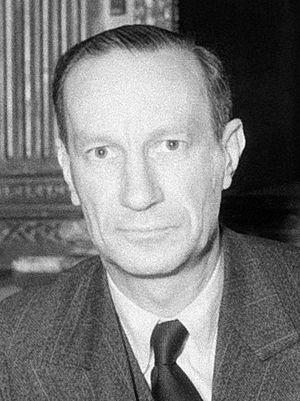Alexandre Parodi facts for kids
Alexandre Parodi (born June 1, 1901 – died March 15, 1979) was a very important French leader. He used secret names like Quartus and Cérat during the war. He was a top government official and a brave member of the French Resistance during World War II. He was chosen by General de Gaulle to lead the French provisional government at that time. Later, he became a politician, represented France at the United Nations and NATO, and was the first French ambassador to Morocco.
Biography
Alexandre Parodi's father, Dominique Parodi, was a philosopher. His grandfather, Dominique-Alexandre Parodi, was a poet. Their family believed in the French Republic.
In 1926, Parodi started working for the Conseil d'État (France), which is like France's highest legal council for government matters. From 1929 to 1938, he helped lead the National Economic Council. In 1931, he married Anne-Marie Vautier. By 1938, he was a high-ranking legal officer for the Conseil d'État. He also became a top director for labor and workforce issues.
When World War II began, Parodi was not called to fight because of his important government job. In October 1940, the Vichy government (which worked with the Nazis) fired him. They thought he was against them. He went back to the Conseil d'État.
From 1942, Parodi often traveled to Haute Savoie. His brother, René Parodi, who was part of the Resistance, was arrested by the Gestapo and died in jail in April 1942. In Haute Savoie, Alexandre Parodi met other important people who were against the Vichy government. They formed a group called the Comité des Experts. This group later became the Comité général d'études in 1943. Using his secret name Quartus, Parodi and his friends planned how France would be governed after the Nazis were defeated.
In the summer of 1943, Parodi had to go into hiding because the Gestapo found some important Resistance documents. In September 1943, he was put in charge of a secret committee for press and information. He also helped create the Resistance's finance committee. In March 1944, Charles de Gaulle chose Parodi to be the main delegate for the French Committee of National Liberation. This committee was the temporary government that organized the Resistance and prepared for France's freedom from the Nazis.
In August 1944, using his other secret name "Cérat", Parodi became the Minister of Liberated Territories. He took on this role in Paris when the city's uprising began. On August 17, he got permission to delay the uprising. But on August 19, to keep the Resistance united, he agreed to start the uprising. He put the Parisian Resistance under the command of Colonel Henri Rol-Tanguy.
On August 20, Parodi and two assistants were arrested by the Nazis. This happened during a truce suggested by the Swedish Consul-General Raoul Nordling. Parodi openly said he was a minister and insisted on meeting General Dietrich von Choltitz, the military commander of Paris. Von Choltitz soon released them. On August 21, the truce ended. On August 22, Parodi led a meeting to set up the new government. On August 25, the day von Choltitz surrendered, Parodi welcomed de Gaulle to Paris. On August 27, de Gaulle honored him as a Compagnon de la Libération.
From September 1944 to November 1945, Parodi was the Minister of Labour and Social Security. He helped create France's national health service. In 1946, he started a career in diplomacy. That same year, he was the main French representative in talks with Italy after the war. He also represented France at the United Nations Security Council. In 1949, he became the secretary-general of the Ministry of Foreign Affairs.
In 1955, he became France's permanent representative to NATO. From 1957 to 1960, he was the first French Ambassador to Morocco. After that, he became the vice-president of the Conseil d'État. From 1964 to 1971, he worked at the World Court in the Hague. He was also involved with several important French organizations. He retired in 1971.
Alexandre Parodi died on March 15, 1979, in Paris. He was buried in Père Lachaise cemetery.
Awards and legacy
Alexandre Parodi received several high honors. These included the Grand Croix de la Légion d'Honneur and the Grand Croix de l'Ordre National du Mérite. He was also made a Compagnon de la Libération.
A street in Paris, Rue Alexandre Parodi, is actually named after his grandfather. However, a square and park in Paris's 16th Arrondissement honors both him and his brother René.
Parodi was played by actor Pierre Dux in the 1966 French-US film Is Paris Burning?. This movie was about the liberation of Paris.
Images for kids
 | Aaron Henry |
 | T. R. M. Howard |
 | Jesse Jackson |




